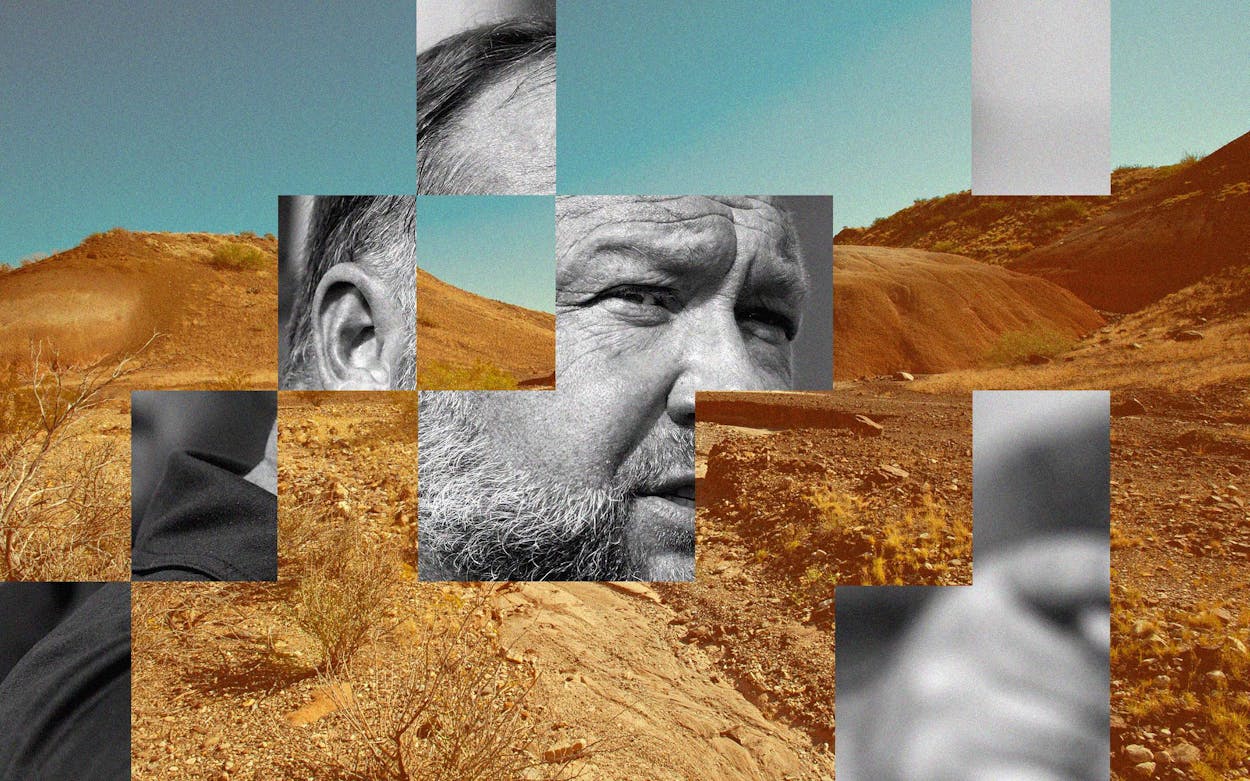On the edge of Big Bend National Park, in the remote far West Texas town of approximately 150, Terlingua residents have coined a lot of sayings. There’s one about dating in the town: “The odds are good, but the goods are odd.” There’s one about the brand of eccentrics who choose to live there: “Everyone in Terlingua is running from something,” said Stephanie Neckar, a local real estate agent. Another resident recently told me: “We’re all here because we’re not all there.” I was talking to these folks about a new interloper who ought to fit right in: the excitable alt-right radio host and conspiracy theorist Alex Jones.
Jones, along with his Austin-based company, Free Speech Systems, was ordered to pay $1.5 billion in damages to the families of the Sandy Hook shooting victims in 2022, after he promoted false conspiracy theories suggesting that the massacre was a hoax and that the deceased children were actually actors. Shortly after that verdict, Jones and Free Speech Systems filed for Chapter 11 bankruptcy. “I’m officially out of money, personally,” Jones said in his Infowars podcast. “It’s all going to be filed. It’s all going to be public. And you will see that Alex Jones has almost no cash.”
Nevertheless, property records show that in June 2023, his wife, Erika Wulff Jones, purchased twenty acres—appraised at $20,000, according to property records—in Terlingua Ranch, a sparsely populated swath of desert north of town. If Terlingua is offbeat, the ranch is even weirder. It’s where David Kaczynski, brother of Ted Kaczynski—the Unabomber—retreated to connect with nature and escape the media throngs that wanted to know more about his infamous sibling. And it’s where a woman named Judith Broughton kept her dead mother buried in a blue tarp beneath her kitchen floor while she collected the woman’s Social Security benefits.
Terlingua and the ranch have also long been places of refuge. As Texas Monthly writer at large Robert Draper wrote in 1996, “Terlingua is the state’s last outpost for outcasts, for those maligned American loners who fashion their own crude American dream in the anonymity of the desert.” A Terlingua resident, who owns land neighboring the plot Wulff Jones bought, spoke with me on the condition that I withhold his name. (Terlingua is an intimate hamlet, he noted, and “anything I say is going to piss off half of the community.”) He told me that Terlingua was the first place he’d ever felt a sense of belonging. “And I’m not the strangest person in town,” he said, “only maybe the third strangest.”
Terlingua residents first took notice of Jones and his wife last year, when they were seen on a couple of occasions dining at High Sierra, one of the few watering holes in the area. “I heard that he partied pretty hard,” said Neckar, who also expressed some surprise that the Joneses bought property where they did. “That’s a weird piece of land to buy,” Neckar said. “There’s no development [paved roads, electricity, sewage]; there’s some homesteads; it’s rough as heck.” Erika Wulff Jones’s real estate agent, Kate Keenan, declined to be interviewed on the purchase.
Jones’s neighbors could attest to the land’s rawness. Inhabitants of the ranch get their electricity from a solar system and water via catchment. The unnamed neighbor first encountered the Joneses in February of this year, when they showed up in a “big, black, brand-new Suburban-type thing,” he said, adding that Jones was personable, while his wife seemed “very nice.” “Would I have chosen Alex Jones as my neighbor if I had a choice?” the neighbor said. “No. But that said, we have a very diverse community here.”
As the neighbor described it, Terlingua is deeply divided as far as politics are concerned—a division that was spawned during the COVID-19 pandemic. (In the November 2020 election, Donald Trump secured 53 percent of the vote in the precinct where Terlingua lies, while Joe Biden scored 45 percent; in 2016, the divide between Trump and Hillary Clinton was a more narrow 48 percent to 46 percent, though the number of voters also increased in 2020.) “Before the great divide of COVID, we all were very functional together,” he said. “Now we’re working on bridging those gaps.” Referring to Jones, he said, “Half the community is going to love him. It doesn’t happen to be my half of the community.”
Rhonda Haberer, the owner of Tin Valley Retro Rentals, a private campground that offers both primitive camping and “glamping,” belongs to that other half. “I would love to have him for a neighbor,” Haberer said of Jones. “He might make a landing strip for future alien[s].” Jones has been known to promote theories around extraterrestrial life, and he has claimed the U.S. government is communicating with space aliens with the help of psychedelic drugs. “We have many, many people, including extreme liberals, that believe in aliens out here,” Haberer added.
Jones gave his neighbor no indication of what he intended to do with the land, and neither Jones nor Wulff Jones responded to requests for an interview. “He didn’t even know where his property was,” his neighbor said. “I had to go show him.” Jones isn’t the first to purchase land in the region without comprehending where, exactly, it is. In recent years, Terlingua has experienced rapid development, particularly since the pandemic, which has caused property prices to skyrocket.
Living in the Texas desert is not for the faint of heart, and it’s still too early in Jones’s tenure to say whether he can abide by its terms. His neighbor told me another saying about Terlingua: “You’re either a good neighbor, or you won’t be a neighbor for very long.”
- More About:
- Alex Jones
- Terlingua








